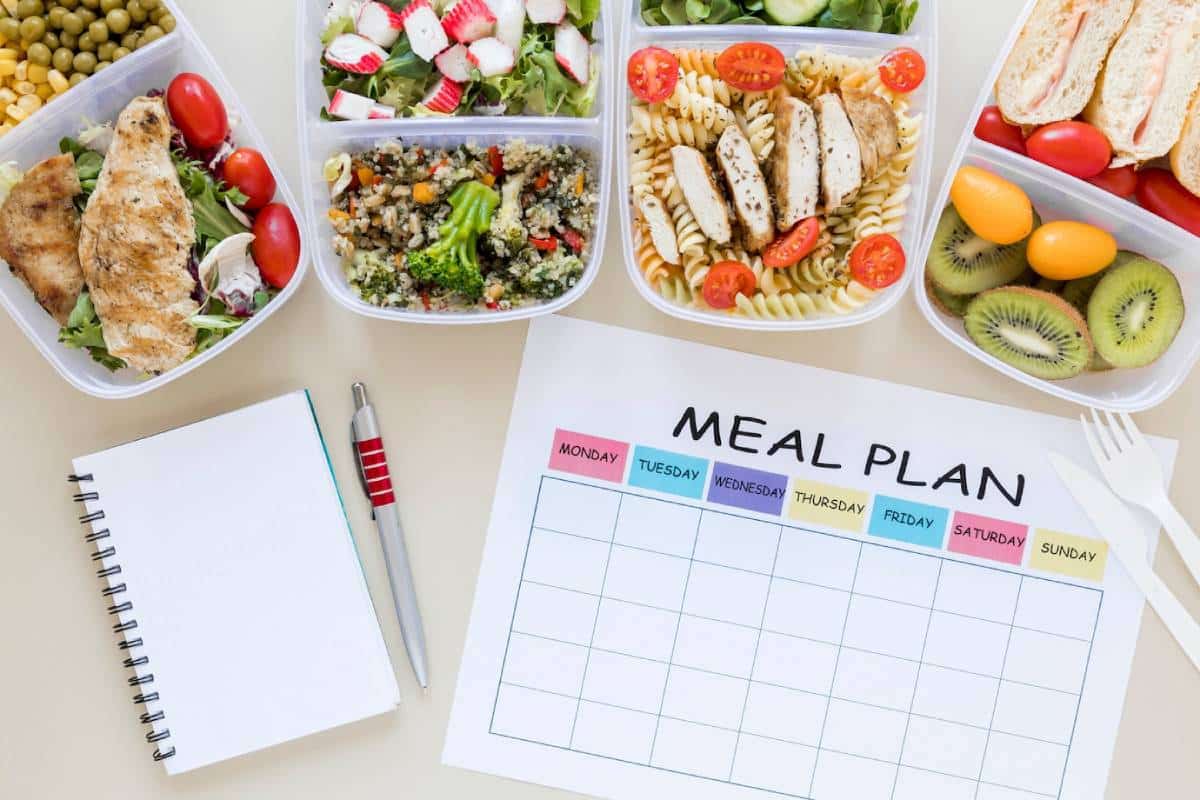
Budget-Friendly Meal Planning for Young Adults
Do you ever stare blankly at your bank account come month-end? Wonder where it all vanished? You’re certainly not sailing this ship alone.
In our whirlwind lives, takeout beckons like a siren song. Rising grocery prices intensify the challenge of tracking food expenses. But here’s the silver lining: meal planning and budgeting are your culinary compass. They can guide you to healthier eating and financial freedom. With a little strategy, you’ll stress less and save more each month!
This guide will help you make tasty, healthy meal plans on a budget. Let’s dig in!
Why Meal Planning Matters for Your Wallet (and Your Well-being)
Meal planning is more than saving money. It helps you take charge of your health, time, and finances.
Benefits of meal planning:

- Reduces impulse buying at supermarkets
- Minimises food waste
- Saves time and energy during the week
- Encourages healthier, more balanced eating habits
Quick Insight: WRAP UK says the average UK household wastes about £700 in food yearly. That’s almost £60 a month!
How to Start Meal Planning: Step-by-Step
Step 1: Assess Your Weekly Schedule
Ask yourself:
- Are there nights you’re working late?
- Are there upcoming social events or travel days? Plan quick meals for busy days and more involved recipes when you have extra time.
Step 2: Set a Realistic Budget
Start by reviewing your current grocery spending:
- Check bank statements or app spending reports.
- Decide on a realistic weekly or monthly food budget.
Starter Tip: Most young adults can aim for around £20–£40 per week, depending on location and diet.
Step 3: Choose Your Recipes
Focus on simple, affordable, and versatile meals.
Budget-friendly staples include:
- Stir-fries
- Pasta dishes
- Rice bowls
- Soups and stews
- One-pan bakes
Tip: Pick recipes with everyday ingredients for several meals. This helps save money and cut down on waste.
Step 4: Create a Shopping List
Organise your list by categories:
- Fresh produce
- Proteins
- Dairy
- Dry goods
- Frozen foods
- Extras (spices, sauces)
Golden Rule: Stick to the list to avoid impulse purchases.
Step 5: Batch Cook and Prep
Spend a couple of hours once a week to:
- Pre-chop veggies
- Cook large batches of rice, soups, or stews
- Portion meals into containers
Batch prepping saves money and cuts weekday stress dramatically.
Smart Grocery Budgeting Tips
1. Embrace Store Brands
Supermarket own brands are often made by the same producers as branded goods — but for less!
2. Shop Seasonal Produce
In-season fruits and vegetables are cheaper, tastier, and more nutritious.
Example: Strawberries are plentiful and cheap in summer. In winter, opt for apples or root vegetables.
3. Compare Price Per Unit
Always check the shelf label showing “price per 100g” or “price per item.” This helps avoid paying more for flashy packaging.
4. Buy in Bulk (Strategically)
For staples like:
- Rice
- Pasta
- Lentils
- Oats
- Canned goods
Bulk buying can mean huge long-term savings.
5. Avoid Shopping Hungry
You’re more likely to grab expensive snacks if you shop on an empty stomach. Always eat before hitting the shops!
Affordable Meal Planning Ideas
Breakfast
- Overnight oats with frozen berries
- Peanut butter toast with banana
- Greek yoghurt with a sprinkle of granola
Lunch
- Tuna salad wraps
- Vegetable soup with crusty bread
- Leftover rice bowls
Dinner

- Chickpea curry with rice
- Pasta with marinara sauce and roasted vegetables
- Sheet-pan chicken with potatoes and broccoli
Snacks
- Homemade popcorn
- Boiled eggs
- Apple slices with peanut butter
Real-Life Story: Jamie’s £25 Weekly Grocery Challenge
Jamie, a 22-year-old university student, decided to limit her grocery budget to £25 weekly.
How she did it:
- Bought rice, oats, and beans in bulk
- Shopped at discount supermarkets like Lidl and Aldi
- Meal prepped five days’ worth of lunches and dinners every Sunday
Results after 2 months:
- Saved over £200
- Discovered a love for cooking
- Felt more energised from home-cooked, balanced meals
Jamie’s Lesson:
Planning isn’t about restriction — it’s about freedom and creativity.
Common Meal Planning Mistakes to Avoid
- Overcomplicating meals: Simple recipes save time and money.
- Ignoring leftovers: Plan to eat leftovers for lunch or freeze them for future dinners.
- Neglecting cravings: Include “fun meals” in your plan to stay motivated. For example, make homemade pizzas.
- Be flexible: Change your meals based on your energy, cravings, or schedule.
Top Tip: Consider your meal plan as a flexible guide, not a strict contract.
How to Maximise Food Savings Even Further
Meal Swap with Friends
Batch-cook together and trade meals for variety without extra cost.
Use Cashback and Loyalty Apps
Apps like:
- Shopmium
- Airtime Rewards
- Supermarket loyalty points
It helps you save money on everyday shopping without changing your habits.
Try a “Pantry Challenge”
Try planning a week’s meals with what you have at home each month. Use only what’s in your cupboards and freezer. Zero spending = bonus savings!
Budget-Friendly Grocery Staples List
Proteins:
- Eggs
- Canned beans
- Tofu
- Tinned tuna
Grains:
- Rice
- Oats
- Pasta
- Couscous
Vegetables:
- Carrots
- Onions
- Frozen spinach
- Potatoes
Fruits:
- Bananas
- Apples
- Frozen mixed berries
Other Essentials:
- Peanut butter
- Canned tomatoes
- Basic spices (cumin, paprika, garlic powder)
FAQs: Budget Meal Planning
How much should a young adult spend on groceries weekly?
In the UK, £20–£40/week is a solid target, but location and dietary needs vary.
Can meal planning help with health goals, too?
Absolutely! Planned meals are often more balanced, portion-controlled, and nutrient-dense than convenience options.
How long does meal planning take weekly?
Around 30–60 minutes to plan, and another 1–2 hours for prep. The time investment pays back in stress saved during busy weekdays.
Conclusion: Eat Well, Save Big, Stress Less
Mastering meal planning is like discovering a treasure map for success. With savvy grocery budgets, you wield the power to save money while eating healthier. Embrace smart food-saving habits that slice through stress, ensuring nourishment without the hassle. These invaluable skills will serve you well for years to come!
Ready to take control of your meals and your money? Grab a notebook (or open your Notes app), sketch out this week’s meals, and make your shopping list today.


